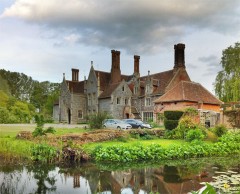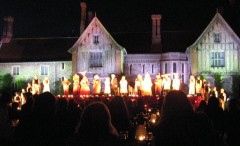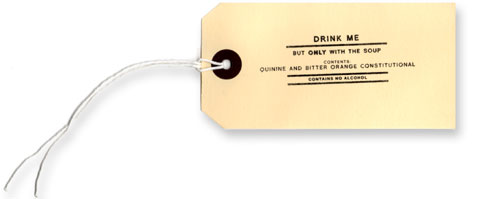Posts from — May 2011
Peripatetic Dining with Alice
I first heard about the brilliant people at Artichoke Trust through seeing the TV coverage of their 2009 Lumiere event in Durham (and apparently there’s another one later this year).
Artichoke describe themselves as “a creative company that works with artists to invade our public spaces and put on extraordinary and ambitious events that live in the memory forever”, and based on their latest event (“extravaganza” in fact is not too strong a word), Dining with Alice, which runs until 21st May 2011, they have succeeded in that goal once again. If you’re reading this before the end of the run, do try and get tickets if you can – but be sure to wrap up warmly if you attend.
 Dining with Alice is presented as part of the Norfolk & Norwich Festival, around the gorgeous 15th century private house Elsing Hall in Norfolk (see view of the North Front, left). Artichoke have taken over the extensive and almost labyrinthine gardens and turned them into a wonderland of theatrical experiences and al fresco dining. As to the concept, Director Hilary Westlake suggests that the event is the answer to the question, “Just what happened to all the character’s in Alice’s adventures when they were no longer needed in her dreams?” It’s in fact a re-staging of an event originally created for the Salisbury Festival in 1999, when it was commissioned by now-Artichoke co-director Helen Marriage when she was the Festival’s director.
Dining with Alice is presented as part of the Norfolk & Norwich Festival, around the gorgeous 15th century private house Elsing Hall in Norfolk (see view of the North Front, left). Artichoke have taken over the extensive and almost labyrinthine gardens and turned them into a wonderland of theatrical experiences and al fresco dining. As to the concept, Director Hilary Westlake suggests that the event is the answer to the question, “Just what happened to all the character’s in Alice’s adventures when they were no longer needed in her dreams?” It’s in fact a re-staging of an event originally created for the Salisbury Festival in 1999, when it was commissioned by now-Artichoke co-director Helen Marriage when she was the Festival’s director.
Peripatetic dining, inspired both by the seating arrangements at the Mad Hatter’s Tea Party (where you keep moving round the seats at the table) and by Lewis Carroll’s interest in mathematics, is at the heart of Dining with Alice, which is punctuated (and concluded) by a series of amusing theatrical presentations from a small cast of around 10 “Hosts” – in the form of the familiar White and Red Queens, the Queen (and King) of Hearts, the Duchess, the White Knight, the White Rabbit, the Mad Hatter, Tweedledum & Dee, butler Mr Alastair, and no less than half-a-dozen Alices – including “Alice After Wonderland”, “Alice in Wonderland”, a Tall Alice and some Tiny Alices. Plus a host of others, notably the “Turban Team”, about whom, more in a moment. Most, if not all the performers are from the East of England. The food is provided by Bompas and Parr with the aid of City College Norwich.
To begin with, you walk into and through the immaculate gardens via a circuitous route to find a marquee, with crisps and Victorian accompaniments, Hendrick’s Gin and a live string quartet, and have a wander around, talk to people – I was lucky enough to have a brief chat with Artichoke co-director Nicky Webb, whom I met originally in the Cambridge Picture House bar thanks to Bill Thompson – read the fascinating programme and find your name on the curiously-named “Seating Plan”. I say “curiously”, because there is, in fact, no indication where you’ll be sitting. Instead, there’s a colour and a number – and you notice that your colour/number combination is different from those of anyone you arrived with. Hmmm. After the guests have all arrived, the main characters march in to the accompaniment of a brass band and the first part of the event begins.
It turns out that the colour and number identify the waiter (“server” is not the right word, as they don’t serve the food) who will lead you, personally, to your places during the course of the evening: the former indicating the colour of their turban and the latter a number the member of the “Turban Team” holds and announces. You are separated from anyone else in your party as you go off, following your waiter on a circuitous route through the darkening gardens, while the sounds of Wonderland are heard around you in the forms of the calls of strange birds and creatures echoing across the lawns and emerging suddenly from nearby bushes. You have a chance to get to know the others who have the same colour and number as yourself – I was lucky enough to find myself in the company of three women with whom I had the opportunity to chat on our walk, before being separated as we were shown our tables for the first course. The main characters flit among the tables as you eat, engaging in conversations or not, until your waiter collects you for a further intricate walk to the next course. The tables are littered with strange things: little cards with riddles, labels, and other paraphernalia. You are indeed led into a kind of Wonderland, with a marvellous fantastic atmosphere unlike anything you’ve previously experienced.
 The evening was a series totalling six courses of excellent food, each taken at a different table, and after the first course, with one or more different people previously unknown to me – a truly wonderful idea and I’m pleased to have enjoyed several excellent discussions over dinner. Soon you find yourself in the company of the rest of your party, among others, and ultimately you’re led to a dining area that’s laid out almost like a conventional restaurant – except that it’s under the sky, and in front of you is a stage and live musicians before the South Front of the beautifully illuminated Elsing Hall (see main photo) – for the dessert and finale (above). The dining area was actually built out over the moat.
The evening was a series totalling six courses of excellent food, each taken at a different table, and after the first course, with one or more different people previously unknown to me – a truly wonderful idea and I’m pleased to have enjoyed several excellent discussions over dinner. Soon you find yourself in the company of the rest of your party, among others, and ultimately you’re led to a dining area that’s laid out almost like a conventional restaurant – except that it’s under the sky, and in front of you is a stage and live musicians before the South Front of the beautifully illuminated Elsing Hall (see main photo) – for the dessert and finale (above). The dining area was actually built out over the moat.
There’s a certain amount of walking involved, of which you should be aware (apparently arrangements can be made if your mobility is limited, but I don’t know the details) and the night we were there, the temperature dropped to around 6º Celsius, so do wrap up well. But do be sure not to miss this marvellous event. Congratulations to Artichoke and the whole team involved for a quite remarkable and unmissable experience. Definitely the best event I’ve attended for some time.
May 15, 2011 Comments Off on Peripatetic Dining with Alice
UK Local Elections 2011: Goodbye Compromise
Why did the Lib Dems do so badly yesterday? The short answer is “probably not what you think.”
The commonest evaluation that seems to be floating around currently, the day after the election took place and now the results have become clear, is that, exactly a year after the General Election that brought the Lib Dem/ Tory coalition, the voting population expressed the view that it didn’t like the cuts and other disastrous policies proposed by the coalition. As a result the Labour vote rose; but in addition, the Liberal Democrats took a particular beating while the Conservatives got off more or less scot free (with a slight increase in seats in fact). There seems to be some mystery in many minds as to why the Lib Dems should have borne the brunt of the nation’s displeasure while the Tories remained unscathed.
In my mind, there’s no mystery at all. Imagine a conscientious Labour voter on the Left, perhaps quite far to the Left, who over the period since 1997 (actually before that in fact), saw the party drifting significantly rightwards until it was more centrist than anything else. That was a cause for concern, but even more disturbing was the behaviour of Blair, over Iraq and the imaginary Weapons of Mass Destruction which never were, and of course that many believe he knew all along never were.
The only significant party to oppose the Iraq involvement was the Liberal Democrats. And as time went by, and Labour never repealed the excesses of Thatcherism (just as Clinton never reversed Reagan and Bush senior, incidentally*) never reined in the financial institutions (that were to bring ruin upon us as an inevitable result of the combined efforts of Reagan and Thatcher), never in fact took any moves to the left at all to any great extent while at the same time increasingly threatening civil liberties, kow-towing to big media companies over internet use, media ownership and behaviour, the Lib Dems came to look more and more attractive.
Trouble was, the Lib Dems were by and large from two backgrounds. There were those who were originally Liberals, many of whom were of course quite remarkable and progressive people — my particular favourite being Beveridge, who conceived a model of the Welfare State before the end of the Second World War which, implemented as much as was practical by the 1945 Labour government, worked pretty well on the whole until Thatcher started attacking it.
But the others were formerly members of the Social Democratic Party, a spinoff of what was essentially the right wing of the Labour Party when the latter was rather closer to being (though not actually being) a Socialist party than it was today. They were certainly to the Right of the Labour Party at the time of the Gang of Four, but where they stood with respect to “New Labour’ was possibly a different matter.
Those of us firmly on the Left, dissatisfied and betrayed by the Christian Democrat-style New Labour edifice (whose policies, using techniques learned from Clinton, had been crafted by focus group and market research and not by fervent belief in the need for representation of working people; and who were funded, like the Tories, by big business and others inimical to their needs) wanted somewhere to go. Somewhere where we might actually have a chance of the party we voted for actually winning some seats (ie not Respect or some other fringe Leftist party). The Lib Dems said enough of the right things for us to be interested in supporting them, especially when everyone else in the country seemed to be on the right.
Unfortunately, of course, the Lib Dems were on the right too — or at least part of them was. Many of us were dismayed last year that the Lib Dems formed a coalition with the Tories, even if we knew full well that a partnership with Labour would not have been workable. However we consoled ourselves with the thought that at least “our lads” were making the Tories less toxic than they would otherwise have been. With hindsight, this seems debatable.
What has happened in the past year is that we have seen threats from the Government to many things we hold dear, from Council services to the NHS to the BBC, and cuts that are very evidently ideological rather than fiscally necessary. It’s Thatcherism in a skin. In the meantime the Labour Party under Miliband has sought to distance itself somewhat from New Labour and even appear to move leftwards a little and behave a little more at least like a Social Democrat, rather than a Christian Democrat, party. No doubt many of us would like it to move further to the Left, but we’re also conscious that a right-wing press would persuade the majority that a hard Left party was unelectable and dangerous. It will take a lot of effort to depose the influence of the Right in the media, and modern technology is only part of the answer — one of the most popular web sites in the UK is, I gather, that of the Daily Mail, for example. That’s one reason why the unbiased nature of the BBC , though we may complain about it from time to time, is so important.
So what we did yesterday is we went back home. Tory voters remained Tory voters – and why shouldn’t they. We bolstered the Labour vote, even in areas where only the Tories were in with a chance — like where I live in the East of England. Here, there hasn’t been a Liberal (let alone a Labour) MP for 60 years, and if I wasn’t voting Conservative it didn’t matter one little bit who I voted for, thanks to First Past the Post (which we are now stuck with indefinitely… I wonder if we could propose the Scottish system of FPTP plus Lists to ensure proportionality?). Last time I looked, my vote here was actually worth 0.01 votes in terms of how likely it was to change things. So I voted Labour, and I hope the pundits look at the popular vote, something that was always ignored before the Information Age, and note the numbers well.
We post-Socialists and friends of like enough mind withdrew our support from the Lib Dems, and without us, their vote went, in most places, back to much earlier, primaevally low levels.
We withdrew our support because we disagreed with the statement that “compromise is not betrayal”; because we don’t believe the compromises should be being made. You cannot make acceptable compromises with the Right when the correct answers are to the Left of both your positions — something I wish Obama had grasped in the US, incidentally.
And because we suddenly realised that of those two wings of the Liberal Democrat party, the Centre Right one was very much in control. And we did not come all this way to vote for yet another party of the Right. We had already made our compromises by supporting a party with a known right-leaning tendency, which hitherto had been ameliorated by a small number of Lib Dem figures who shared our views, for example, on the environment.
We didn’t like discovering that we had been supporting a party of the Right for some time. So we went home.
So what happens now? Well, the atrocious behaviour of Cameron with regard to the antics of the No to AV mob – about which I am absolutely certain that absolutely nothing will be done – will no doubt sour relations in the Cabinet. But Blair and Brown hated each other for years and managed to run the country. So there is no reason the coalition should fall apart for that reason. And falling apart now is anyway too soon.
The important thing in my view is to ensure that Tory policies are stopped. My expectation is that as time goes by, Labour support will continue to rise. It’s already jumped in a year: as the cuts bite and public sector workers are turned out of their jobs across the country, that can only increase. At a point in the future, a stand by Lib Dem MPs on some issue they feel passionately about would bring about a vote of no confidence in the Government, or some other route to a collapse of the coalition, and we’ll have a General Election – one that Labour will win.
OK, the Labour Party still needs to demonstrate that it really is a party of the Left, for example a manifesto commitment to re-nationalising the rail network and undoing some of the ravages of Thatcher might be a good start, but hey, we are so used to voting for the “least worst” we can probably live with that as long as it keeps a slide back to Thatcherism off the table.
Image courtesy of secretlondon123 via WikiMedia Commons
May 6, 2011 Comments Off on UK Local Elections 2011: Goodbye Compromise



